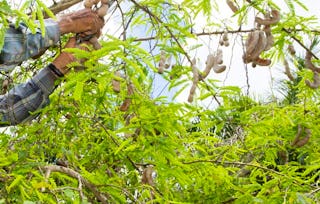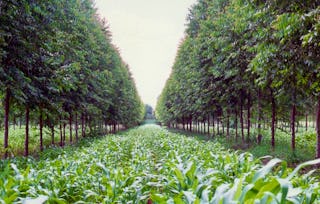Conserving and restoring tropical forest landscapes offers an opportunity to address pressing environmental and social challenges. Effective conservation and restoration initiatives support multiple objectives, including ecosystem functioning, climate change mitigation and adaptation, food security, and economic growth.

Tropical Forest Landscapes 101: Conservation & Restoration

Tropical Forest Landscapes 101: Conservation & Restoration

Instructor: Eva Garen
12,144 already enrolled
Included with
177 reviews
What you'll learn
(1) Fundamentals of tropical forest landscape management
(2) Conservation & restoration strategies
(3) Funding conservation & restoration
Skills you'll gain
Details to know

Add to your LinkedIn profile
21 assignments
See how employees at top companies are mastering in-demand skills

There are 7 modules in this course
Welcome to the course! In this module, we will begin exploring what tropical forest landscapes are and why they are important. We will also discuss threats to forest landscapes and motivations for conserving and restoring them.
What's included
7 videos7 readings2 assignments2 discussion prompts
In this module, we will examine tropical forests from an ecological lens. Understanding how natural ecological processes work will lay the groundwork for knowing how to develop effective conservation and restoration techniques, which we will cover in later modules.
What's included
9 videos4 readings4 assignments
Now that we have examined the ecological forces that shape tropical forest landscapes, we will shift our focus to people. In this module, we will consider how people are affected by and affect tropical forest landscapes and how considering local access to resources is a pivotal consideration when considering effective, equitable interventions.
What's included
13 videos6 readings2 assignments1 discussion prompt
In this module, we will look at some fundamental conservation concepts. At its core, conservation involves protecting existing habitat or forest cover, but selecting where to prioritize protection, is more complicated. Conservation decisions depend on a suite of considerations, such as how one measures biodiversity, how one considers changes in the landscape over time, and how conservation affects other goals, such as ecosystem function.
What's included
8 videos4 readings4 assignments
In this module, we will explore the process of restoration. As you will soon see, forest restoration encompasses a range of different practices. Selecting which practice to use will depend on a variety of considerations, starting with the level of degradation and the overall goals of the initiative.
What's included
12 videos7 readings3 assignments
In the last two modules, we looked at fundamental concepts for both conservation and restoration. Here, we will look at a third approach to sustainable land management, which integrates tree cover with other agricultural practices: agroforestry. Agroforestry systems have many different forms and applications - we will learn about several of them here.
What's included
11 videos4 readings3 assignments1 discussion prompt
In this last part of the course, we will learn about funding conservation and restoration initiatives. This module introduces some financial terminology and tools that are useful for communicating to investors, then discusses obtaining two different types of funding: philanthropic and public.
What's included
13 videos9 readings3 assignments2 discussion prompts
Instructor

Offered by
Explore more from Environmental Science and Sustainability
 Status: Preview
Status: PreviewErasmus University Rotterdam
 Status: Free Trial
Status: Free TrialUniversity of Florida
 Status: Free Trial
Status: Free TrialUniversity of Florida
 Status: Preview
Status: PreviewUniversity of Zurich
Why people choose Coursera for their career

Felipe M.

Jennifer J.

Larry W.

Chaitanya A.
Learner reviews
- 5 stars
89.26%
- 4 stars
9.03%
- 3 stars
0.56%
- 2 stars
1.12%
- 1 star
0%
Showing 3 of 177
Reviewed on Aug 17, 2025
Very useful review of the key concepts, rationale and mechanisms to protect tropical forests.
Reviewed on Dec 13, 2024
Interesting, very good speakers, most of the time the slides were clear and contained the important information.
Reviewed on Mar 31, 2024
I love this course it helped me out a lot on agriculture

Open new doors with Coursera Plus
Unlimited access to 10,000+ world-class courses, hands-on projects, and job-ready certificate programs - all included in your subscription
Advance your career with an online degree
Earn a degree from world-class universities - 100% online
Join over 3,400 global companies that choose Coursera for Business
Upskill your employees to excel in the digital economy
Frequently asked questions
To access the course materials, assignments and to earn a Certificate, you will need to purchase the Certificate experience when you enroll in a course. You can try a Free Trial instead, or apply for Financial Aid. The course may offer 'Full Course, No Certificate' instead. This option lets you see all course materials, submit required assessments, and get a final grade. This also means that you will not be able to purchase a Certificate experience.
When you purchase a Certificate you get access to all course materials, including graded assignments. Upon completing the course, your electronic Certificate will be added to your Accomplishments page - from there, you can print your Certificate or add it to your LinkedIn profile.
Yes. In select learning programs, you can apply for financial aid or a scholarship if you can’t afford the enrollment fee. If fin aid or scholarship is available for your learning program selection, you’ll find a link to apply on the description page.
More questions
Financial aid available,

